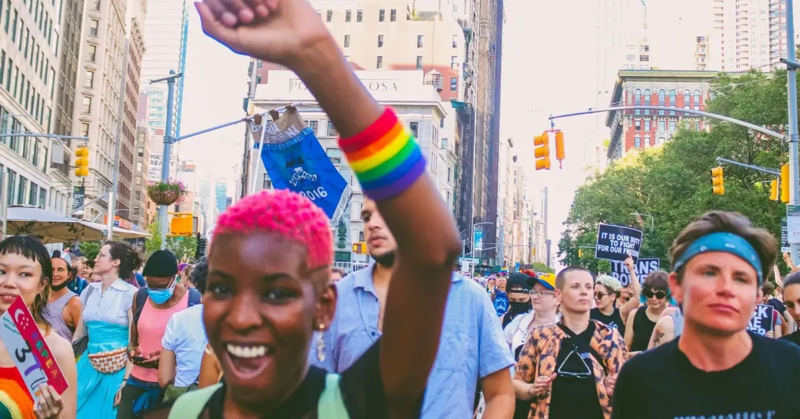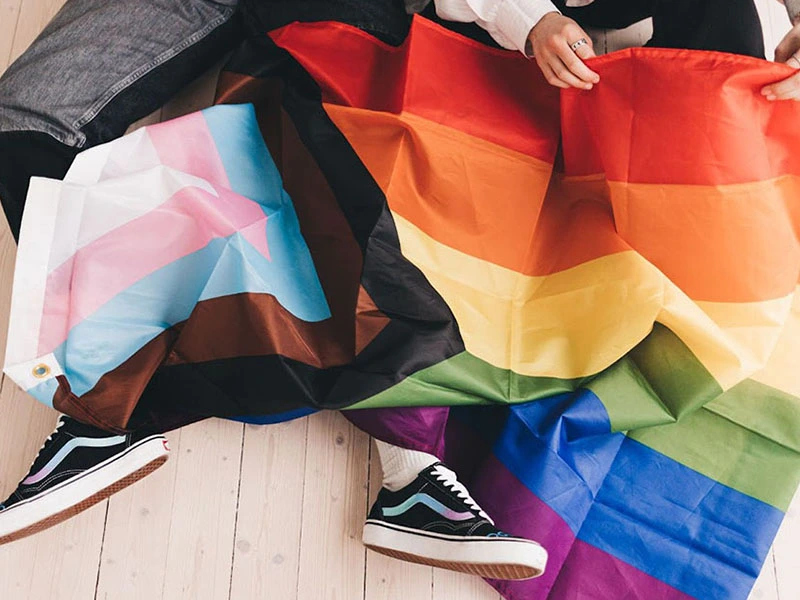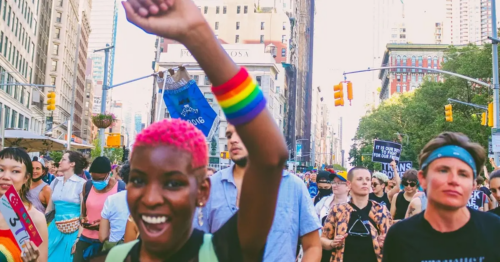
Table of Contents
Yes, Affirming Care Improves LGBTQIA+ Mental Health—Here’s the Data

Written By: Elizabeth Kroll

Clinically Reviewed By: Dr. Don Gasparini
Updated: June 26, 2024
6 min.
LGBTQIA+ youth face various unique challenges that can cause adverse mental health effects, but affirming care improves outcomes. Here is a look at the data.
Learn more about our Clinical Review Process
Table of Contents
Every June is Pride Month — a chance to celebrate and affirm all people who fall under the LGBTQIA+ umbrella, including those who identify as lesbian, gay, bisexual, transgender, queer, questioning, intersex, asexual, and any other identities within the spectrum of gender and sexuality. Pride Month is also a time to recognize the LGBTQIA+ community’s ongoing challenges, among which mental health is paramount.
Data consistently shows that LGBTQIA+ youth face higher levels of mental health issues than their non-LGBTQIA+ peers, and many in the queer community have limited access to life-saving mental healthcare. Below, we delve into what you need to know about the latest LGBTQIA+ mental health stats, the reasons why this population faces mental health disparities, and the importance of LGBTQIA+-affirming care — like that offered at Charlie Health.

LGBTQIA+-affirming care for teens and young adults
Virtual intensive treatment that honors all identities.
The latest LGBTQIA+ mental health stats
The recent surveys and research surrounding this group and mental health are saddening and alarming. The Trevor Project’s “2023 U.S. National Survey on the Mental Health of LGBTQ Young People” revealed the following harrowing statistics:
- 41% of LGBTQIA+ youth dealt with suicidal thoughts in the past year
- Approximately 14% of LGBTQIA+ youth attempted suicide in the past year (with rates getting higher for minority groups)
- 67% of LGBTQIA+ youth report symptoms of anxiety
- 54% of LGBTQIA+ youth report symptoms of depression
Charlie Health treats many of these young people — in fact, historically, over half of our clients have indicated that they hold an identity that falls under the LGBTQIA+ umbrella. We’ve seen the severity of the mental health problems outlined by the Trevor Project firsthand. Here are some statistics from our LGBTQIA+ clients before they start mental health treatment at Charlie Health:
- 71% report clinically significant levels of depression
- 58% report clinically significant levels of anxiety
- 40% report active suicidal ideation
- 55% report a previous suicide attempt
- 39% report self-harm behaviors in the last 30 days
Why is the LGBTQIA+ community at higher risk for mental health issues?
These poor mental health rates are indicative of the culture within which LGBTQIA+ youth currently live. Discrimination, stigmatization, and a lack of understanding foster an environment where these young individuals struggle to find acceptance and support. Here are some other reasons why the LGBTQIA+ community is at an increased risk for mental health problems, including anxiety, depression, and suicide.
Anti-LGBTQIA+ policies and legislation
At the time of publication, there are currently 40 states that actively have anti-LGBTQIA+ legislation in the works and over 500 proposed anti-LGBTQIA+ bills across those 40 states. These anti-LGBTQIA+ laws have a significant impact on the feelings of safety and support within this community as these laws often target fundamental rights, including access to healthcare, education, and legal protections, leaving LGBTQIA+ individuals vulnerable and marginalized. According to the Trevor Project’s most recent national survey, about two-thirds of LGBTQIA+ youth reported that hearing about these laws made their mental health a lot worse.
Victimization
Instances of discrimination, harassment, and violence are alarmingly prevalent, with a large proportion of LGBTQIA+ individuals reporting frequent verbal abuse, physical attacks, and systemic inequalities in healthcare, education, employment, and housing, according to a wide range of data. Moreover, this victimization isn’t confined to overt actions but is embedded in the societal fabric, creating environments where LGBTQIA+ individuals constantly feel unsafe and unwelcome. This pervasive sense of danger and rejection profoundly affects mental health, leading to chronic stress and trauma.
Minority stress
On top of all the typical challenges faced by kids, teens, and young adults, LGBTQIA+ youth often experience a phenomenon known as minority stress, which refers to the unique stressors they encounter just because they are part of a marginalized group.
For LGBTQIA+ youth, minority stress stems from societal prejudice, discrimination, a higher risk of physical or verbal violence, and the stigma attached to their sexual orientation or gender identity. They may feel the need to hide their identity and internalize negative beliefs that unaccepting people have towards them, resulting in adverse effects on self-esteem and sense of self. It’s like they carry extra weight on their shoulders, constantly reminding them that they are different and not fully accepted by some parts of society.
Lack of access and support
Equitable access to mental healthcare is a nationwide problem, and individuals who identify as LGBTQIA+ can have an even harder time accessing care than most. Less than half of LGBTQIA+ youth report being able to access mental health support when they want it. Furthermore, finding a mental health professional who is culturally competent in working with LGBTQIA+ individuals can be difficult, and finding a mental health provider with an LGBTQIA+ identity can be even harder.
Some lack of access comes from a lack of support from family and friends. 47% of LGBTQIA+ youth who did not have access to care indicated that they were afraid to talk about their mental health with anyone else, according to the Trevor Project’s 2023 survey. Also, 41% said they didn’t want to ask their parent/caregiver for permission. This lack of support from close relationships exacerbates feelings of isolation and helplessness. The stigma surrounding mental health and LGBTQIA+ identities within their immediate social circles can deter them from seeking help, further entrenching their struggles.
The impact of LGBTQIA+-affirming care
In order for LGBTQIA+ young people’s mental health to improve, they need to get help –– and not just any help, but the right help. That’s where LGBTQIA+-affirming care comes in. This type of care affirms and validates an individual’s identity rather than trying to change it, helping queer youth address mental health concerns, explore relationships, build self-esteem, and feel empowered in their sexual and gender identity.
LGBTQIA+ affirming care can be lifesaving, and the data speaks for itself: Research has shown that LGBTQIA+ people who feel as though they have access to affirming spaces, such as homes, schools, or online communities, report lower rates of suicide attempts than those who do not have access to affirming spaces. Similarly, transgender people who live in a home where all individuals are respectful of their gender pronouns have lower rates of suicide attempts than transgender individuals who live in environments where none or only some of the individuals are respectful of pronouns.
Here at Charlie Health, the foundation of our care model is to provide affirming care to all clients, which results in incredible mental health improvements for routinely discharged LGBTQIA+ clients. Here are some statistics from our LGBTQIA+ clients after they complete mental health treatment at Charlie Health:
- Approximately 60% of LGBTQIA+ clients fall below the clinical threshold for depression
- 70% of LGBTQIA+ clients fall below the clinical threshold for anxiety
- 74% of LGBTQIA+ clients report no self-harm by discharge
- We see a 71.5% reduction in suicidal thoughts for LGBTQIA+ clients who reported suicidal ideation at intake
As this data shows, affirming care and supportive environments can significantly improve LGBTIQA+ youth mental health outcomes and eliminate health disparities, offering a path toward healing and hope. Together, we can create a more inclusive and compassionate society where everyone can thrive regardless of identity.

How Charlie Health can help
If an LGBTQIA+ young person in your life is dealing with mental health struggles or a mental health condition, Charlie Health is here to help. Charlie Health’s virtual Intensive Outpatient Program (IOP) provides more than once-weekly mental health treatment for young people and families dealing with serious mental health conditions. Our expert clinicians incorporate identity-affirming therapy into individual counseling, family therapy, and group sessions. This kind of holistic mental health support makes managing your well-being possible. Fill out the form below or give us a call to start healing today.




